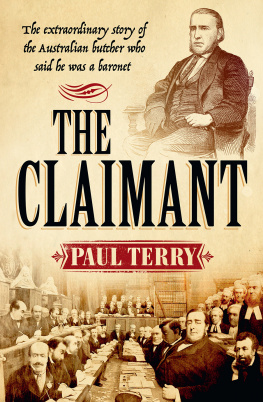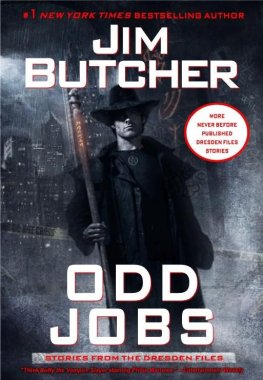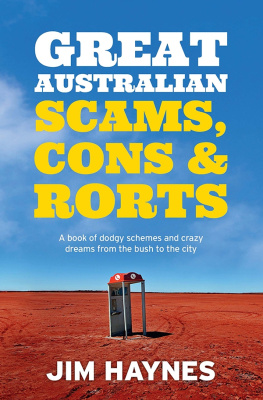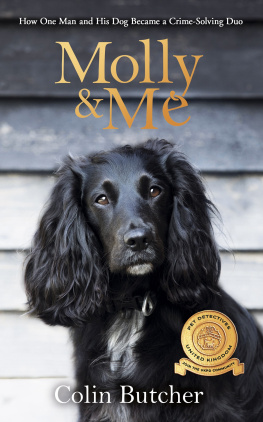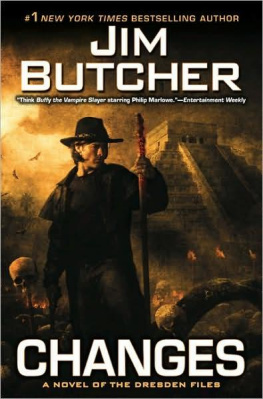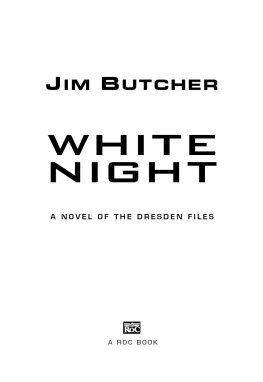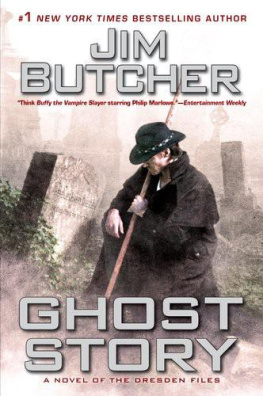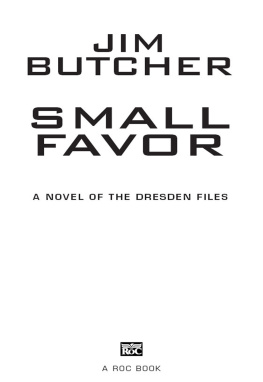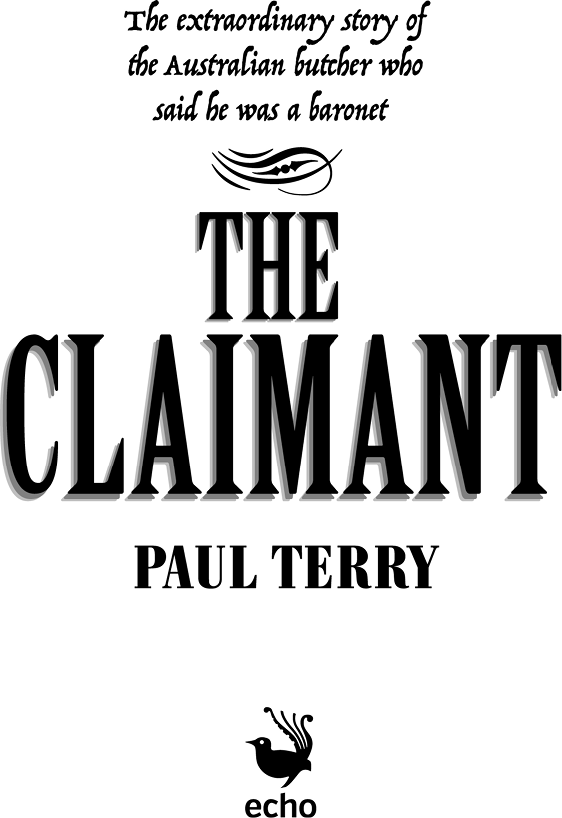The public would say such things could never happen. And yet the chief characters did exist, and the incidents did happen.
Mark Twain
Contents
Authors Note
The direct quotes in this book were sourced from newspaper reports, books, court records, diaries and letters. Where conversations are generally accepted they have been presented as such. Where dispute arises, the text attributes the source of the quotes. For example, the Claimants robust encounter with the lawyer Bowker is taken from the very partisan Edward Kenealy in his Trial at Bar of Sir Roger Tichborne . So, too, are the words of the Dowager Lady Tichborne at the moment of her reunion with her son. Many of the undisputed conversations that form part of the dialogue in this book can be found in newspaper reports at the National Library of Australias excellent website, trove.nla.gov.au.
List of Characters
Lord Edward Bellew A tattooed nobleman.
Andrew Bogle A Doughty family servant and supporter of the Claimant.
Sir William Bovill The judge in the Claimants civil trial.
Tom Castro A humble Wagga butcher.
Mary Castro/Tichborne Toms wife.
The Claimant Once known as Tom Castro, he claimed to be Sir Roger Tichborne.
Sir Alexander Cockburn The lead judge in the Claimants criminal trial.
Charley Cox The owner of an important pocketbook.
William Cresswell A lunatic with a mysterious past.
Lily Enever The Claimants second wife.
William Gibbes A gullible Wagga solicitor.
Vincent Gosford The Tichborne estate steward.
Henry Hawkins A highly effective barrister.
John Holmes The Claimants solicitor.
Edward Hopkins Former Tichborne family solicitor and the Claimants fishing partner.
Dr Edward Kenealy A brilliant but erratic barrister.
Mary Ann Loder Arthur Ortons sweetheart.
Jean Luie, aka Carl Lundgren A very important witness.
Colonel Franklin Lushington Tichborne House tenant and Claimant supporter.
John Moore Roger Tichbornes valet.
Guildford Onslow, MP A great supporter of the Claimant.
Lady Katherine Radcliffe, nee Kattie Doughty Roger Tichbornes cousin and true love.
Arthur Orton A mysterious butchers son from Wapping.
Edward Rous A publican and supporter of the Claimant.
Lord Horace Rivers An aristocratic supporter of the Claimant.
Richard Slate A friend of Tom Castro.
Agnes (Theresa) Tichborne The Claimants oldest daughter.
Lady Henriette (the Dowager) Tichborne Rogers mother.
Roger Tichborne The missing heir to the Tichborne baronetcy.
Lady Mabella de Tychbyrna The originator of a 12th century curse.
George Whalley, MP A supporter of the Claimant.
John Whicher A private detective.
Prologue
The fat man in the courtroom no longer had a name.
Once he had called himself Tom Castro, butcher from Wagga Wagga, Australia, but now he claimed to be someone far more important the missing Sir Roger Charles Doughty Tichborne, baronet of Tichborne Park in Hampshire.
It was a claim not without merit. Dozens of people who knew Tichborne, who was assumed lost at sea years earlier, were certain Castro was indeed the heir to one of Englands oldest fortunes. In homes and pubs and streets and halls across Britain, tens of thousands more were so fervent in their belief that they transformed him from man to monument.
What was in a name? For the fat man, everything. If he won he would be titled and wealthy. If he lost, he faced disgrace, ruin and even prison because Rogers noble and powerful family were certain the butcher from Wagga was neither Castro nor Tichborne, but Arthur Orton, son of an East End merchant and one of historys greatest impostors.
Now known as the Claimant, he had emerged from a place few had heard of to assume the ancient position he said was his. In May 1871, the first of two marathon trials began to establish whether he was telling the truth. At the centre sat the Claimant, an enormous mass of humanity whose grand ambitions and imperious air made him the most recognised man in the United Kingdom.
Broad-faced, bewhiskered and stylishly dressed in the latest fashions, he gave an impression of utter solidity and unshakable confidence. Around him sat legal men, made small and lean by his imposing bulk. It was their job to poke and prod at a story that seemed outlandish beyond the limits of credibility, yet also hummed with possibility of truth. On benches above the Claimant sat the gentlemen of the jury. They would decide if he was baronet or butcher.
At first glance it seemed there should be no case at all. The Claimant was rough-spoken and hard-handed; Tichborne had been a coddled aristocrat. The morbidly obese Claimant threatened to burst out of his finely tailored clothes; Tichborne had been angular and thin. The Claimants only language was English, spoken (some said) with a Cockney accent; Sir Rogers first language was French and his English was heavily influenced by his Parisian upbringing. And, importantly, Tichborne supposedly had tattoos on one arm but the Claimant had none. To the Tichborne family it was proof the Claimant was a brazen fraud, and with a fortune to protect, they were willing to spend almost all of it to stop him.
But he had powerful support. The only person who had always maintained hope of finding Roger Tichborne alive his widowed mother accepted the Claimant with an open heart as her long-lost son. It had the world asking, how could a mother not know her own child? And there were others equally certain Tichborne had returned from the dead: parliamentarians, peers, doctors, lawyers and loyal servants to the family all swore on their honour that the Claimant was indeed the prodigal son, home from the wilderness.
True, he had forgotten things that Roger should have known intimately, yet he could recall dozens of small details of Rogers life that meshed perfectly with the truth. He knew the names of Rogers pet dogs and descriptions of the paintings that hung on the walls of his ancestral home. He remembered names and recognised faces. He could share memories of moments in Rogers youth and he seemed to hide a hint of refinement behind a mask of coarseness. Most of all, he looked a lot like a Tichborne.
In his smile, the broad sweep of his forehead or the heavy line of his eyebrows, people saw traits that clearly reminded them of members of that ancient family. To some, the resemblance was so strong it was impossible to think he could be anyone but a Tichborne. What was more, it was said that the Claimant and Tichborne shared the same unusual facial twitch a compulsive tic of the eye. The Claimant even had Rogers knock-kneed walk. Surely this could not be coincidence, the believers argued. The odds otherwise were unthinkable.
And if that were not enough, there was another argument, one best debated behind closed doors. It was not fit for the ears of ladies but among themselves, gentlemen quietly discussed something about the Claimant that was very unusual: his penis retracted into his body like that of a horse. As remarkable as this was, however, it was not the point. The really compelling argument was that Roger Tichborne may well have had the very same condition .
It combined to put a case so convincing that when the Claimant visited the Tichborne estate, he was greeted by a brass band and a joyous mob that welcomed him home from the dead. The enthusiasm spread like a fever through British working-class hearts and soon he was feted as a hero, the figurehead of a movement that threatened to turn Victorian society on its head.

